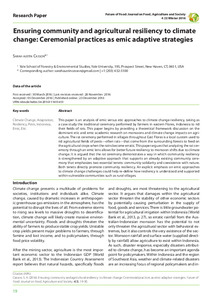View/
Date
2016-12-23Author
Casson, Sarah AustinSubject
630 AgricultureMetadata
Show full item record
Aufsatz

Ensuring community and agricultural resiliency to climate change: Ceremonial practices as emic adaptive strategies
Abstract
This paper is an analysis of emic versus etic approaches to climate change resiliency, taking as a case study the traditional ceremony performed by farmers in eastern Flores, Indonesia to rid their fields of rats. This paper begins by providing a theoretical framework discussion on the dominant etic and emic academic research on monsoons and climate change impacts on agriculture. The rat ceremony performed in villages throughout East Flores is a local custom used to rid agricultural fields of pests—often rats—that come from the surrounding forests to feed on the agricultural crops when the rains become erratic. This paper argues that analyzing the rat ceremony through an emic lens allows for better future resiliency to monsoon shifts due to climate change. It is argued that the rat ceremony demonstrates a way in which community resiliency is strengthened by an adaptive approach that supports an already existing community ceremony that emphasizes two essential tenets: community solidarity and coexistence with nature. Both tenets directly promote community resiliency. An explicit emphasis on emic approaches to climate change challenges could help re-define how resiliency is understood and supported within vulnerable communities such as rural villages.
Citation
In: Future of Food: Journal on Food, Agriculture and Society. Witzenhausen : University of Kassel, Department of Organic Food Quality and Food Culture. - Vol. 4, No. 3 (2016), S. 19 - 30Citation
@article{urn:nbn:de:hebis:34-2016111451451,
author={Casson, Sarah Austin},
title={Ensuring community and agricultural resiliency to climate change: Ceremonial practices as emic adaptive strategies},
year={2016}
}
0500 Oax 0501 Text $btxt$2rdacontent 0502 Computermedien $bc$2rdacarrier 1100 2016$n2016 1500 1/eng 2050 ##0##urn:nbn:de:hebis:34-2016111451451 3000 Casson, Sarah Austin 4000 Ensuring community and agricultural resiliency to climate change: Ceremonial practices as emic adaptive strategies / Casson, Sarah Austin 4030 4060 Online-Ressource 4085 ##0##=u http://nbn-resolving.de/urn:nbn:de:hebis:34-2016111451451=x R 4204 \$dAufsatz 4170 7136 ##0##urn:nbn:de:hebis:34-2016111451451
<resource xsi:schemaLocation="http://datacite.org/schema/kernel-2.2 http://schema.datacite.org/meta/kernel-2.2/metadata.xsd"> 2017-01-03T16:39:42Z 2017-01-03T16:39:42Z 2016-12-23 2197-411X urn:nbn:de:hebis:34-2016111451451 http://hdl.handle.net/123456789/2016111451451 eng Department of Organic Food Quality and Food Culture at the University of Kassel, Germany and Federation of German Scientists (VDW) Urheberrechtlich geschützt https://rightsstatements.org/page/InC/1.0/ Climate Change Adaptation Resiliency Pests Indonesia Emic Etic 630 Ensuring community and agricultural resiliency to climate change: Ceremonial practices as emic adaptive strategies Aufsatz This paper is an analysis of emic versus etic approaches to climate change resiliency, taking as a case study the traditional ceremony performed by farmers in eastern Flores, Indonesia to rid their fields of rats. This paper begins by providing a theoretical framework discussion on the dominant etic and emic academic research on monsoons and climate change impacts on agriculture. The rat ceremony performed in villages throughout East Flores is a local custom used to rid agricultural fields of pests—often rats—that come from the surrounding forests to feed on the agricultural crops when the rains become erratic. This paper argues that analyzing the rat ceremony through an emic lens allows for better future resiliency to monsoon shifts due to climate change. It is argued that the rat ceremony demonstrates a way in which community resiliency is strengthened by an adaptive approach that supports an already existing community ceremony that emphasizes two essential tenets: community solidarity and coexistence with nature. Both tenets directly promote community resiliency. An explicit emphasis on emic approaches to climate change challenges could help re-define how resiliency is understood and supported within vulnerable communities such as rural villages. open access In: Future of Food: Journal on Food, Agriculture and Society. Witzenhausen : University of Kassel, Department of Organic Food Quality and Food Culture. - Vol. 4, No. 3 (2016), S. 19 - 30 Casson, Sarah Austin </resource>
The following license files are associated with this item:
Urheberrechtlich geschützt

